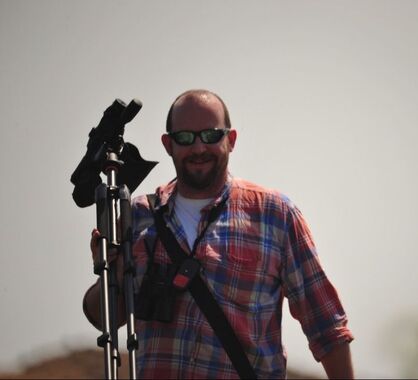 Prof. Richard Grenyer Prof. Richard Grenyer It was a real privilege to come to the second ICCB, two years after I gave a keynote at the inaugural conference down in Sde Boker. The intent of the conferences, it seems to me, is to help continue to establish conservation science (and I hope, too, conservation social science) as a mainstream component of research and teaching in Israel’s university system. The conferences also aim to foster an inclusive environment at which the work of practitioners and scientists in the SPNI, INPA, and elsewhere - and of early career researchers in universities of course - is as welcome and as valued as the latest research from the top professors. Both these aims seems to be becoming realised fast. To me, one of the real strengths of organismal biology courses in Israel is the continued focus on field observations: it’s at so much risk in many courses worldwide. And one of the things I saw very clearly at the second conference at the Technion in Haifa was that same field expertise being further developed through into research outside the universities, by graduates in the various branches of government and the NGOs, and quite a few collaborations that reached across the research-action gap to do meaningful conservation work. I also saw lots of great talks by young academics just getting started, and who were getting stuck in to these incredibly difficult problems - successful conservation interventions in tiny communities where rare hyaenas were killing pets, conservation planning to the meter scale, the sudden discovery of a deep water reef community just off Tel Aviv. It made me very hopeful for the future. What would I have loved to see more of? Conservation - and conservationists - across borders. I know how hard that is right now, but meaningful conservation must follow the distributions of life on Earth as much as it can. At the inaugural conference there were two Palestinian participants, and I believe one Jordanian. This time there were none. There’s a real danger in turning inwards - we see it trivially but instructively in the UK where we spend a fortune on conserving ospreys and barn owls, to the detriment of many other species of concern, knowing that both birds matter locally but also that both have global ranges covering entire hemispheres and are not really in much trouble. So: species and habitats that are relatively common is Israel may be rare or threatened in regions beyond the border fences, and the reverse may also be true. And of course many migrating birds, drifting plant seeds and slowly-warming corals will ignore those same borders anyway. So for the third conference, I’d love to see a session, ideally with talks from conservationists in neighbouring countries, that celebrates the successes and recognises the copious challenges of conservation in and across the geopolitics of the region. Tough, I know - but if such a session proves temporarily impossible, then someone at least must explore the potential dangers of an insular conservation. And in time, hopefully, such a session can run. Rich Grenyer Associate Professor, School of Geography & the Environment Fellow and Tutor, Jesus College University of Oxford |
News published regularly in the ISCB newsletter. Maintained by Leigh Kroeger and Uri Roll Archives
May 2019
Categories
All
|
Proudly powered by Weebly
 RSS Feed
RSS Feed